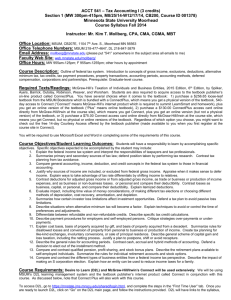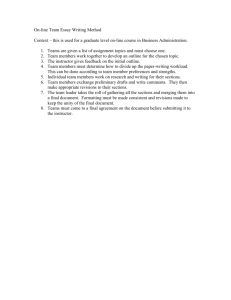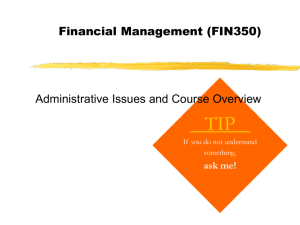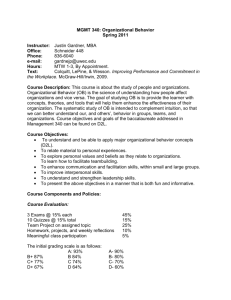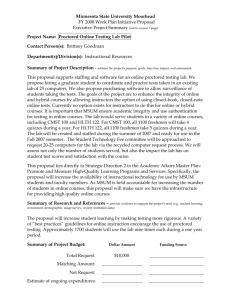ACCT 441 - Minnesota State University Moorhead
advertisement
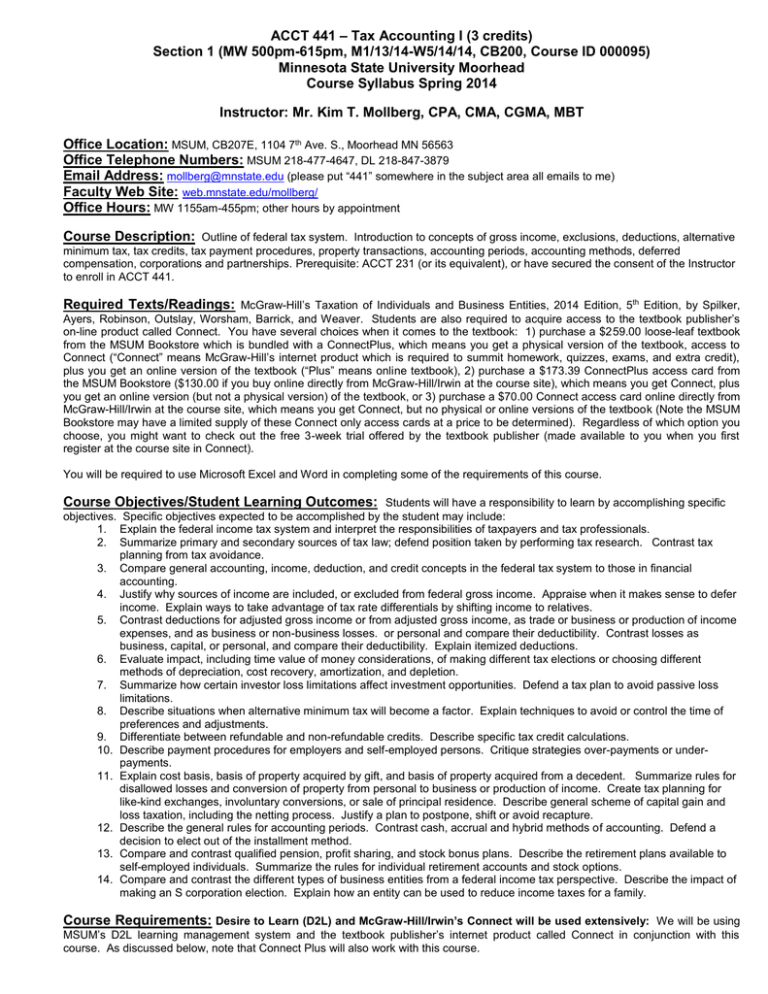
ACCT 441 – Tax Accounting I (3 credits) Section 1 (MW 500pm-615pm, M1/13/14-W5/14/14, CB200, Course ID 000095) Minnesota State University Moorhead Course Syllabus Spring 2014 Instructor: Mr. Kim T. Mollberg, CPA, CMA, CGMA, MBT Office Location: MSUM, CB207E, 1104 7th Ave. S., Moorhead MN 56563 Office Telephone Numbers: MSUM 218-477-4647, DL 218-847-3879 Email Address: mollberg@mnstate.edu (please put “441” somewhere in the subject area all emails to me) Faculty Web Site: web.mnstate.edu/mollberg/ Office Hours: MW 1155am-455pm; other hours by appointment Course Description: Outline of federal tax system. Introduction to concepts of gross income, exclusions, deductions, alternative minimum tax, tax credits, tax payment procedures, property transactions, accounting periods, accounting methods, deferred compensation, corporations and partnerships. Prerequisite: ACCT 231 (or its equivalent), or have secured the consent of the Instructor to enroll in ACCT 441. Required Texts/Readings: McGraw-Hill’s Taxation of Individuals and Business Entities, 2014 Edition, 5th Edition, by Spilker, Ayers, Robinson, Outslay, Worsham, Barrick, and Weaver. Students are also required to acquire access to the textbook publisher’s on-line product called Connect. You have several choices when it comes to the textbook: 1) purchase a $259.00 loose-leaf textbook from the MSUM Bookstore which is bundled with a ConnectPlus, which means you get a physical version of the textbook, access to Connect (“Connect” means McGraw-Hill’s internet product which is required to summit homework, quizzes, exams, and extra credit), plus you get an online version of the textbook (“Plus” means online textbook), 2) purchase a $173.39 ConnectPlus access card from the MSUM Bookstore ($130.00 if you buy online directly from McGraw-Hill/Irwin at the course site), which means you get Connect, plus you get an online version (but not a physical version) of the textbook, or 3) purchase a $70.00 Connect access card online directly from McGraw-Hill/Irwin at the course site, which means you get Connect, but no physical or online versions of the textbook (Note the MSUM Bookstore may have a limited supply of these Connect only access cards at a price to be determined). Regardless of which option you choose, you might want to check out the free 3-week trial offered by the textbook publisher (made available to you when you first register at the course site in Connect). You will be required to use Microsoft Excel and Word in completing some of the requirements of this course. Course Objectives/Student Learning Outcomes: Students will have a responsibility to learn by accomplishing specific objectives. Specific objectives expected to be accomplished by the student may include: 1. Explain the federal income tax system and interpret the responsibilities of taxpayers and tax professionals. 2. Summarize primary and secondary sources of tax law; defend position taken by performing tax research. Contrast tax planning from tax avoidance. 3. Compare general accounting, income, deduction, and credit concepts in the federal tax system to those in financial accounting. 4. Justify why sources of income are included, or excluded from federal gross income. Appraise when it makes sense to defer income. Explain ways to take advantage of tax rate differentials by shifting income to relatives. 5. Contrast deductions for adjusted gross income or from adjusted gross income, as trade or business or production of income expenses, and as business or non-business losses. or personal and compare their deductibility. Contrast losses as business, capital, or personal, and compare their deductibility. Explain itemized deductions. 6. Evaluate impact, including time value of money considerations, of making different tax elections or choosing different methods of depreciation, cost recovery, amortization, and depletion. 7. Summarize how certain investor loss limitations affect investment opportunities. Defend a tax plan to avoid passive loss limitations. 8. Describe situations when alternative minimum tax will become a factor. Explain techniques to avoid or control the time of preferences and adjustments. 9. Differentiate between refundable and non-refundable credits. Describe specific tax credit calculations. 10. Describe payment procedures for employers and self-employed persons. Critique strategies over-payments or underpayments. 11. Explain cost basis, basis of property acquired by gift, and basis of property acquired from a decedent. Summarize rules for disallowed losses and conversion of property from personal to business or production of income. Create tax planning for like-kind exchanges, involuntary conversions, or sale of principal residence. Describe general scheme of capital gain and loss taxation, including the netting process. Justify a plan to postpone, shift or avoid recapture. 12. Describe the general rules for accounting periods. Contrast cash, accrual and hybrid methods of accounting. Defend a decision to elect out of the installment method. 13. Compare and contrast qualified pension, profit sharing, and stock bonus plans. Describe the retirement plans available to self-employed individuals. Summarize the rules for individual retirement accounts and stock options. 14. Compare and contrast the different types of business entities from a federal income tax perspective. Describe the impact of making an S corporation election. Explain how an entity can be used to reduce income taxes for a family. Course Requirements: Desire to Learn (D2L) and McGraw-Hill/Irwin’s Connect will be used extensively: We will be using MSUM’s D2L learning management system and the textbook publisher’s internet product called Connect in conjunction with this course. As discussed below, note that Connect Plus will also work with this course. To access D2L, go to https://mnstate.ims.mnscu.edu/shared/login.html, and complete the steps in the “First Time User” tab. Once you are ready to launch D2L, click on “Go” on the D2L main page, and follow the instructions provided. D2L will have links to the syllabus, CONNECT, the student on-line learning center at http://highered.mcgraw-hill.com/sites/007786235x/student_view0/index.html (which has practice quizzes for each chapter), a study guide, classroom handouts, Instructor PowerPoints, and the course grade book. To access Connect (which is where you will submit your on-line homework, quizzes, projects, and LearnSmart extra credits), you will need to go to the course website at http://connect.mcgraw-hill.com/class/acct441541spring2014mollberg, and enter your access code. For a better experience, consider using Google Crome or Mozilla Firefox (rather than Internet Explorer browser). Save your access code as you may need it again at some point during the course should you experience technical difficulties. McGraw-Hill/Irwin actually has two on-line products which will work with this course, but only one of the two is required: Connect (which has no eBook) or Connect Plus (same as Connect but has an eBook). It is my understanding that the loose-leaf textbooks sold by the MSUM bookstore are bundled with Connect Plus (meaning students who buy their textbook from our bookstore will have both a looseleaf textbook and an eBook, as well as access to Connect). Class and Chapter Schedule: Chapter Lecture, Discussion, In-class problems 1 MW1/13,15 On-line LearnSmart Extra Credit Due Tu5/6 On-line Homework Due Tu1/21 On-line Quiz Due 2 3 4 5 6 7 8 WM1/22, 27 W1/29 MW2/3,5 WM2/12,17 WM2/19,24 W2/26,M3/3 MW3/10,12 Tu5/6 Tu5/6 Tu5/6 Tu5/6 Tu5/6 Tu5/6 Tu5/6 Th1/30 Su2/2 Su2/9 Th2/20 Th2/27 Tu3/4 Su3/23 Th1/30 Su2/2 Su2/9 Th2/20 Th2/27 Tu3/4 Su3/23 9 10 11 MW3/24,26 M3/13,W4/2 WM4/9,14 Tu5/6 Tu5/6 Tu5/6 Su3/30 Su4/6 Th4/17 Su3/30 Su4/6 Th4/17 Exam Tu1/21 Other F1/17 Last Day for Free Add/Drop & Refund, M1/20 No Class M2/10 Ch1-4 W2/5 Project1 W2/19 Project2 W3/5 Ch4-7 M3/3 Fall Advising M3/10 Fall/Summer Registration Begins, W3/12, Ethics Day, M3/17-F3/21 Spring Break (No Class) M4/7 Ch8-10 Th4/10 Project3, Tu4/15 Student Academic Conference 12 WW4/16,23 Tu5/6 Su4/27 Su4/27 F4/18 & M4/21 No Class,T4/22 Last Day to Withdraw 13 MW4/28,30 Tu5/6 Su5/4 Su5/4 Th5/1 Project4 14 MW5/5,7 Tu5/6 Su5/11 Su5/11 M5/12 5pm-7pm Tu5/6 Last day to submit Ch11-14 LearnSmart Extra Credits, W5/7 Study Day, F5/16 Commencement & Grades Due Evaluation Standards/Course Grading Policy: You are responsible for all the material covered in Chapters 1-14 whether or not the Chapter material is specifically covered in class. Your grade for this course will be based on the following points that will be available during the semester: 1. Examinations (4) 400 % of total cumulative points 2. Online Quizzes (top 12 of 14) 60 A:94%-100%, A-:90%-93%, 3. Online Homework (14) 70 B+:87%-89%, B:84%-86% 4. Projects (4) 100 B-:80%-83%,C+:77%-79%, 5. Classroom Activities 50 C:74%-76%,C-:70%-73%, 680 D+:67%-69%, D:60%-66% On-line LearnSmart (up to 3 points Extra Credit per chapter) 42 Participation in Collegiate DECA (up to 5 points Extra Credit) 5 Participation in MSUM Accounting Club (up to 5 points Extra Credit) 5 Participation in Student Academic Conference (up to 20 points Extra Credit for activity related to Tax I) 20 Participation at Volunteer Income Assistance Site (up to 36 points) 36 Keep a personal record of scores for all examinations, quizzes, homework, projects, classroom activities, and extra credits. You can calculate your grade at any time by dividing your points earned to date by total points possible to date. Periodically, the Instructor will post student point totals in D2L (your scores in Connect will not automatically show up in D2L). If any error has been made, it is the student’s responsibility to present written proof of the correct point total as soon as possible after the posting. That means you should SAVE ALL of your work until the end of the semester. 2 If your grade falls below what is acceptable to you, take immediate action. DO NOT WAIT UNTIL THE LAST FEW WEEKS OF THE SEMESTER TO SEEK HELP. Consider the following, not necessarily in this order: (1) Are you working more hours and studying less? Can you correct that situation? (2) Form a study group. (3) Complete the LearnSmart extra credits, (4) Complete the other extra credit opportunities, (5) Work extra problems and see the Instructor for solutions, and (6) See the Instructor on a regular basis. If you are repeating this course, note that only the higher grade will be used to compute your grade point average (GPA). Repeating a course more than once will result in the removal of only one previous grade from the student’s GPA computation. To assure that the GPA is correct, the student must submit a “Repeated Course” form to the Records Office. All course attempts will remain on the student’s permanent academic record. Examinations: Examinations will be given in class on the dates indicated on the Class and Chapter Schedule. The examinations might include true/false, multiple choice, matching, fill in the blank, short essay, or problem-solving type questions. The last examination will be considered your final examination but will not be comprehensive. The exact time of your final examination is listed above. The exact location of your final examination is in your regular classroom. A simple-function calculator, which will be provided by Instructor, must be used for all examinations. On-line Quizzes: You will be using Connect to submit fourteen (14) on-line quizzes, of which you can throw out the two (2) lowest scores. All on-line quizzes are DUE BY 1155pm ON THE ON-LINE QUIZ DUE DATE for each Chapter as per the Class and Chapter Schedule. Late quizzes will be scored zero. The on-line quizzes will generally consist of worksheet, problem-solving type questions (for example, some might require that you fill-in-the-blank, others might involve you choosing the best answer from the alternatives given). You are expected to do the on-line quizzes on your own without the help of others. You will be allowed only one attempt and will be subject to a time limit on all quizzes. Note that many of the questions in Connect (whether in exams, quizzes or homework) are algorithmic (meaning your current version of the question has the same words as another student, but your numbers are different). You can review your answers and the solutions from a previously submitted on-line quiz for which the due date has passed by clicking on the particular quiz in the Connect grade book. Note that a particular quiz (or homework) in Connect might be worth (for example) 90 points according to Connect. However, when Instructor transfers that particular score over to D2L, he will convert to a 5point scale (since all quizzes and homework are worth 5 points each per the syllabus). On-line Homework: You will be using Connect to submit fourteen (14) on-line homework sets. All homework is DUE BY 1155pm ON THE ON-LINE HOMEWORK DUE DATE for each Chapter as per the Class and Chapter Schedule. You are expected to do the homework in a study group or on your own. Each student must submit his/her own homework to get credit. Late homework will be scored zero. NOTE: You can print out the homework in advance. You can check your answers as you go. You can review your answers and the solutions from a previously submitted on-line homework by clicking on the particular homework in the Connect grade book (this feature is available before the due date has passed, in the event you want to see what you did wrong and how to solve the problem, before retrying for a better grade). You can attempt the homework an unlimited number of times (but remember the numbers may change in algorithmic problems). Projects: You will be assigned an ethical tax issue writing project, a research project, and two (2) tax return projects. Each project will be worth 25 points. Classroom Activities: You will earn up to 50 points during the semester (must be present) by completing a variety of in-class activities that reinforce concepts learned in this course. The specific activities, which will be distributed in the classroom as we work through the semester, may include worksheets, group work, and pop quizzes. Online LearnSmart Extra Credit: LearnSmart is an adaptive learning system designed to help students learn faster, study more efficiently, and retain more knowledge for greater success. You can learn up to 2 points extra credit by completing the chapter LearnSmart exercise in Connect. Each chapter LearnSmart exercise has been designed by the publisher to take approximately ½ hour to complete; actual time will vary by student. All LearnSmart extra credits are DUE BY 1155pm ON TUESDAY 12/10/13. You are expected to do these on your own. Late submissions will be scored zero. There are no time limits for LearnSmart exercises. Other Extra Credit Opportunities: Instructor will also award up to 5 points extra credit if you “actively participate” in MSUM Collegiate DECA, and up to 5 points extra credit if you “actively participate” in MSUM Accounting Club. Active participation will be determined by Instructor. Each time you attend an activity for one of these organizations, be sure to ask the faculty representative present to sign a note indicating you were present, then give the note to the Instructor. If you have some prior tax preparation experience and would like to perform volunteer income tax assistance at the Lakes & Prairies Community Action Partnership, Inc. VITA site, I would be willing to discuss giving you up to 36 points (1 points per hour) extra credit. If this is something that interests you, contact the Instructor right away as they are offering training Wednesday January 15 and Thursday January 16, from 500pm-800pm at Concordia College. Note that you will need to pass a competency test in order to serve as a VITA tax preparer. The contact person at Lakes & Prairies is James McKinstra, phone 218-299-7033, jmm@lakesandpraries.net. 3 Course Outline: 1. 2. 3. 4. 5. 6. 7. 8. 9. 10. 11. Conceptual foundations of the tax law. Tax research. Tax formula and computation. Gross income including specific inclusions and exclusions. Business and non-business deductions and losses. Depreciation, cost recovery, amortization, and depletion. Investor losses. Alternative minimum tax. Tax credits. Tax payment procedures. Property transaction, including determination of gains or losses and basis, non-taxable exchanges, capital gains and losses, and Internal Revenue Code Section 1231 and recapture provisions. 12. Accounting periods and methods. 13. Deferred compensation. 14. Overview of corporations and partnerships. Other: MSUM School of Business Mission: We provide a quality business learning experience designed to prepare students for successful and responsible careers. Faculty intellectual contributions are focused on the practice and teaching of business and management. Through involvement in professional activities, the faculty also serves students, the University, and the community. MSUM School of Business Vision: The School of Business will provide a quality business learning experience designed to prepare students for successful and responsible careers. MSUM School of Business Student Learning Goals: Students who graduate from Minnesota State University Moorhead with a major from the School of Business should be able to: -Exhibit basic knowledge of business principles and processes -Write in a clear and professional manner -Prepare and deliver an effective business presentation -Identify and analyze ethical issues in a professional context -Demonstrate basic understanding of business from a global perspective Time Requirements: Each student should expect to spend a minimum of 8-9 hours per week outside of class in preparation. This includes preparing for class, reading the text, completing the homework, quizzes, projects, and reviewing for examinations; anything less and you will be depriving yourself from obtaining your best grade. Food and Drink: Please no food and drink in the classroom. Communication Devices: Cell phones and pagers and other communication devices must be turned off while in the classroom. A communication device going off in the classroom is disturbing and may result in your being suspended from that day’s class. Repeated offenses can result in being dropped from the class with cause. Emergency Procedures: If required to evacuate a classroom or building, students are to proceed to a clear and safe area away from the evacuated site. Take all personal belongings with you. If the emergency procedure occurs during an examination, the examination may be suspended and a new examination may be given at a later date. General: The course syllabus is subject to change. In particular, use the due dates in D2L and/or Connect if different than the dates in this syllabus. In the event of a change, an announcement will be made in class, on D2L, or through an email. It is the responsibility of the student to keep current and develop a clear understanding of all course policies. Classes missed or cancelled for any reason do not relieve the student of the responsibility for the material and/or assignments due that day or on any future class meeting dates. Attendance Policy: Students are expected to attend all class meetings unless they are ill or officially excused as the result of participation in a university function. In the case of individual absence due to jury duty or other legal obligations, the student must notify me prior to the absence. In the case of individual absence due to health or other emergency, the student must notify me as soon as feasible. Academic Honesty: The University expects all students to represent themselves in an honest fashion. In academic work, students are expected to present original ideas and give credit to the ideas of others. The value of a college degree depends on the integrity of the work completed by the student. When an Instructor has convincing evidence of cheating or plagiarism, the following actions may be taken: assign a failing grade for the course in which the student cheated or Instructors may choose to report the offense, the evidence, and their action to the Dean of their college or the Vice President for Academic Affairs. If the Instructor (or any other person) feels the seriousness of the offense warrants additional action, the incident may be reported to the Student Conduct Committee through the Student Support Services Office. The Student Conduct Committee will follow procedures set out in the Student Conduct Code. After its review of the case and a fair, unbiased hearing, the Student Conduct Committee may take disciplinary action if the student is found responsible (see Student Conduct Code for details). 4 A student who has a course grade reduced by an Instructor because of cheating or plagiarism, and who disputes the Instructor’s finding, may appeal the grade, but only using the Grade Appeal Policy, which states that student must prove grade was arbitrary, prejudicial, or in error. Flood Policy: In the event of short-term campus closure, and unless otherwise notified, all instructors are required to continue engaging their enrolled students in instruction by using alternative methods of interaction. For this class, the methods of communication with students will be via D2L, or email. I would encourage students to make sure they have access to both D2L and email, and that they check them periodically for updates. Future assignments (homework, quizzes, projects, and LearnSmart extra credits) will be assigned through D2L, Connect, and/or email. If students are unable to come to campus, they can submit assignments using D2L (if applicable), Connect (if applicable), and email (as an attachment if applicable) or by US mail. Students will still need to complete homeworks, quizzes, projects, and LearnSmart extra credits by the applicable dates as specified in D2L, Connect, and/or email. If you have not already done so, you are encouraged to sign up for the E2Campus emergency notification system (http://www.mnstate.edu/security/) which will be used to notify students about class cancellations and other emergency-related information. Special Accommodations: Students with disabilities who believe they may need an accommodation in this class are encouraged to contact Greg Toutges, Coordinator of Disability Services at 477-4318 (Voice), 1-800-627-3529 (MRS/TTY), toutges@mnstate.edu, Flora Frick 154C, as soon as possible to ensure that accommodations are implemented in a timely fashion. I hope you have an enjoyable learning experience. Good luck! (Revised 1/12/14) 5
